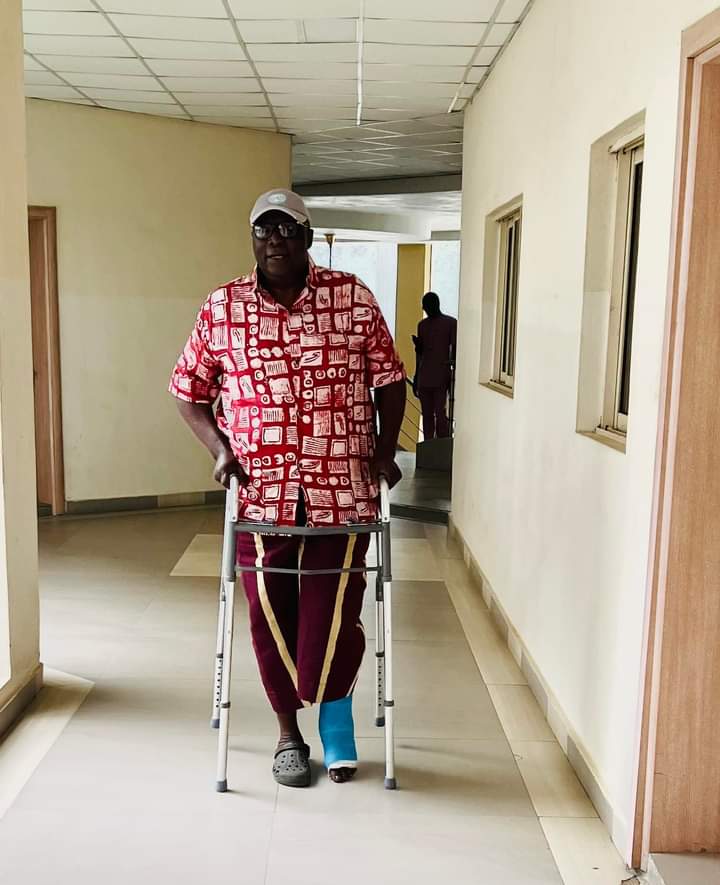By Babafemi Ojudu
I recently travelled to Lagos to visit a former staff member who had suffered a stroke. He was very dear to me during his time as our Chief Photographer, and he once risked his life to protect me. When Abacha’s regime was hunting down media critics, charging them with “accessory after the fact of treason,” this man shielded me from arrest, putting himself at great personal risk.
After leaving his home near Gberigbe on the outskirts of Ikorodu, I received a call from the Chief Imam of my town, inviting me to be his guest at this year’s Maulud Nabiyi. Early the next morning, I set off for Ado Ekiti to attend the event. By evening, I returned home, eager to rest after the long day.
Exhausted and famished, I boiled water in my bedroom with an electric kettle to make tea before bed. Unbeknownst to me, there had been a spill. Unaware of the hazard, I went to sleep. At 3 a.m., I woke to use the bathroom. As I stepped out of bed, my foot slipped on the wet floor. In those few terrifying seconds, I struggled to avoid hitting my head on the hard surface. Instead, my body twisted, and I landed heavily on my left ankle, with all my weight crashing down.
That marked the beginning of an ordeal that would last almost five weeks.
Writhing in pain, I lay on the floor, gathering my strength and composure. The next morning, unable to walk, I called a physician. He bandaged my leg and urged me to get an X-ray. The results confirmed my fear: I had suffered a fracture, and my left foot was soon encased in a cast.
The days that followed were a battle with pain, boredom, and isolation. The house felt emptier than ever. I hired a carer who bathed me with wet towels, as I couldn’t manage on my own. The cast felt like a heavy burden tied to my leg, and every night was a struggle for comfort. Moving from the living room to the bedroom with a walker became an exhausting ordeal.
Yet, amid the physical discomfort, I found solace in work. I immersed myself in writing, reading, and editing, keeping my health challenges private from most of my collaborators. Ironically, this period of immobility turned into one of my most productive. I used the time to plan future projects, finalize events, and began outlining new book titles, even putting the finishing touches on a manuscript headed to the press.
This experience, however, opened my eyes to a greater danger. I learned that many others—far too many—have suffered worse fates from similar domestic accidents. As word of my injury spread, I heard countless stories of people, especially seniors, who had slipped in their homes—often in the bathroom—hit their heads on hard surfaces, and either lost their lives or been left paralyzed.
I feel compelled to share these thoughts in the hope of preventing more tragedies. There are simple precautions we can all take to avoid these accidents, particularly as we age or if we care for older family members:
1. Keep floors dry – Whether in the kitchen, bathroom, or living areas, always ensure that floors are free from spills and moisture.
2. Install non-slip mats – Use these in bathrooms, kitchens, and other potentially wet areas to prevent slipping.
3. Choose rough-surface tiles – Consider installing tiles with more traction in bathrooms and other high-risk areas.
4. Ensure proper lighting – Keep pathways well-lit, especially at night. A small nightlight in the bathroom or hallway can make a big difference.
5. Sit before standing – When waking in the middle of the night to use the bathroom, take a few moments to sit at the edge of the bed before standing. This helps regain balance and avoid dizziness.
6. Install grab bars and railings – In bathrooms or along stairways, sturdy support can prevent serious falls.
7. Wear non-slip footwear – Shoes or slippers with good grip can prevent slipping on smooth surfaces.
8. The eighth point is to focus 100 percent on your immediate environment when you are in the bathroom. Set aside any thoughts or concerns that may be bothering you, and ignore distractions like a ringing phone. Be fully aware of yourself and your surroundings.
I was fortunate—very fortunate—to survive this accident. But many are not so lucky. The difference between life and death can be just a few seconds of carelessness, a fleeting moment of oversight that changes everything. We must be vigilant and take every precaution to avoid becoming victims of these preventable accidents.
My heartfelt appreciation goes to everyone who lightened my burden during this period: doctors, physiotherapists , friends, my wife who, though far away at work, gave instructions for my comfort until she could visit—and my children, who called constantly to check on me. Many local friends came by with bottled water, fruits, balms, and painkillers, all hoping to ease my discomfort.
Thankfully, the cast was removed just two days before Afe Babalola Day, an event I had spent much of this time planning as co-chair of the central committee. Appearing spritely at the event, albeit with a slight limp, surprised those who knew of my ordeal and puzzled those who didn’t. Wearing a knee-length outfit, many stole glances at my swollen foot, wondering what had happened. But despite the lingering pain, I did what I had to do, ensuring the event honouring our icon, Aare Afe Babalola, was a success. From that day forward, I will fondly refer to him as Afe The Great.
*Babafemi Ojudu is a Nigerian journalist, politician, former Senator representing Ekiti Central Senatorial District and former Special Adviser to President Muhammadu Buhari on Political Matters.


